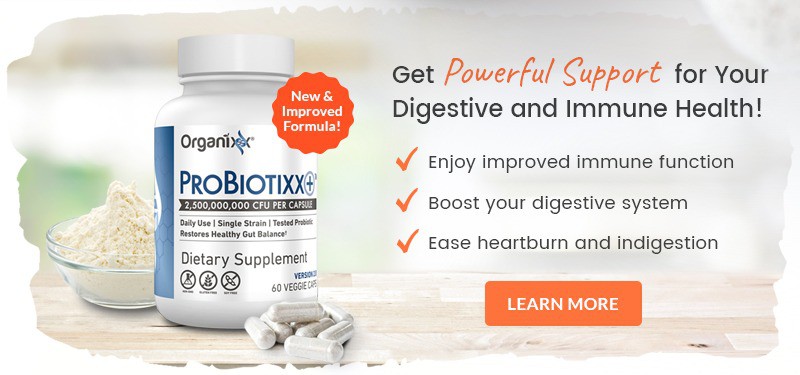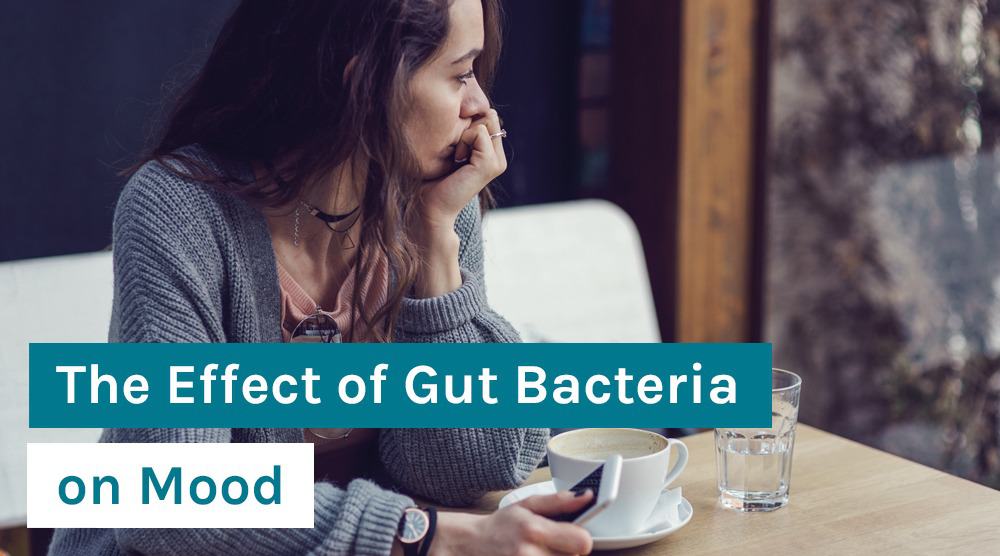The Effect of Gut Bacteria on Mood
In a hurry? Click here to read the Article Summary...
You may have heard lots of talk recently about the importance of having a “healthy gut.” This is an emerging area of research and scientists are continuing to discover precise reasons why the gut (aka gastrointestinal system or GI tract) is one of the most important biological systems in the human body.
[Note: Terminology can vary when talking about gut health. For instance, intestinal flora (or gut bacteria) is often referred to as “microbiota,” and the biological system comprising these trillions of organisms is called your “microbiome.” In other words, you have trillions of microbiota in your microbiome, which reside in your GI tract, or gut. Another common term used to describe the beneficial/good gut bacteria is “probiotics.”]
Here are just a few of the important discoveries researchers have made about the gut:
- The majority of nutrient and water absorption takes place in the gut.
- Around 20 hormone processes are connected to or have processes in the gut.
- The GI tract contains more than 1 billion nerve endings and has more surface area than that of your external skin. These neurotransmitters, known as the enteric nervous system (ENS) are so involved in your body’s processes, that scientists have nicknamed the gut the “second brain.”

- There are over 100 million neurons in the ENS; more than the spinal cord, or the peripheral (outside of the brain or spinal cord) nervous system.
- The brain doesn’t need to operate the GI system. The “second brain” can act independently. In some cases the ENS sends signals to the brain, not the other way around [1].
- The “gut-brain axis” describes the influence the gut, microbiome, and ENS have on the brain, including both emotional and cognitive functions [2].
- The gut contains 70% to 80% of your body’s immune cells.
- The GI microbiome prevents colonization by potentially pathogenic (“bad”) microorganisms, provides energy for the gut wall from undigested food, and regulates the mucosal immune system [3].
- GI microbiota contribute to energy homeostasis (stability), prevent mucosal infections, and, importantly, contribute to the maintenance of an intact GI barrier, which seems to be closely related to infectious, inflammatory, and allergic diseases [4].
- Any disruption to the harmony of the GI microbiome affects the function of the host’s (your body’s) defense systems.
Can Your Gut Health Impact Your Mood?
Probably the most surprising effect the gut-brain axis and microbiome have on your body is that to do with mood [5].
Science has long recognized much of our supply of neurochemicals originates in the intestines. Most of your serotonin is made there [6], as well as approximately 50% of dopamine.
However, it’s only recently that serious consideration has been given to the role our microbiota (the bacteria in the gut) play in creating those chemicals [7,8].
A 2015 story in The New York Times shares interviews with and quotations from several scientists on the cutting edge of this area of research, including one of the first to propose the neurochemical aspects of the gut-brain axis − Mark Lyte, a microbiologist at Texas Tech University Health Sciences Center [9].
Lyte and other researchers have found that among the many chemicals secreted by our microbiota, some are identical to the substances “used by our neurons to communicate and regulate mood, like dopamine, serotonin, and gamma-aminobutyric acid (GABA). These, in turn, appear to play a function in intestinal disorders, which coincide with high levels of major depression and anxiety [10].”

For example, in 2014 a group of Norwegians studied the feces of 55 people, noting depressive patients had certain bacteria in common.
It’s due to this type of research that it’s becoming more commonly accepted that anxiety, depression, and several pediatric disorders, including autism and hyperactivity, are linked to gastrointestinal abnormalities [11].
It was once thought that stress caused the immune system to be weakened, which in turn affected how bacteria in our microbiome behaved. Now, somewhat revolutionarily, research indicates that certain bacteria actually cause stress, which then impairs the immune system.
The truly exciting aspect of all this science is work that Lyte and his peers are doing in the realm of reversing disorders. For instance, using the secretions of certain bacteria to relieve anxiety and elevate mood by putting the microbiome back into harmony—proposing probiotics (beneficial, life-giving organisms) can be tailored to treat psychological disorders. These are somewhat flippantly being referred to as “psychobiotics [12].”
One study carried out in Sweden found that mice raised without microbes were far more active outside. Not only that, the microbe-free mice were observed to have less anxiety and be more daring overall.
Serotonin is a known factor in mood, anxiety, and depression, to name a few of its functions [13,14]. The connection to the manufacturing and the body’s use of this essential chemical (some consider it a hormone) is gaining increasing attention. Or, as a 2015 publication in Behavioral Brain Research stated [15]:
“The brain-gut axis is a bidirectional communication system between the central nervous system and the gastrointestinal tract. Serotonin functions as a key neurotransmitter at both terminals of this network. Accumulating evidence points to a critical role for the gut microbiome in regulating normal functioning of this axis … There is also substantial overlap between behaviors influenced by the gut microbiota and those which rely on intact serotonergic neurotransmission.”
More research is being done to identify the precise processes occurring, but it’s certainly becoming crystal clear… the health of your microbiome is essential for even your mental and emotional wellbeing [16].
Organixx ProBiotixx+ formula contains a single, super-strain of Lactobacillus plantarum, designed to help alleviate constipation… eliminate gas and belly bloat… support your entire immune system… and give you total digestive protection.

 Sources:
Sources:
Article Summary
The GI tract contains more than 1 billion nerve endings and has been nicknamed the “second brain.”
The “gut-brain axis” describes the influence the gut, microbiome, and enteric nervous system have on the brain, including both emotional and cognitive functions.
Anxiety, depression, and several pediatric disorders, including autism and hyperactivity, are linked to gastrointestinal abnormalities.
Secretions of certain bacteria can relieve anxiety and elevate mood by putting the microbiome back into harmony.




I grew up eating raw potatoes. I'm 77 in good health, and I still love raw potatoes. I do peel them, otherwise, no extras on them.
Thank you for publishing these highly informative articles! They really educate us about our bodies and the impact of our choices to ingest the right foods and the right supplements. Thank you for taking care of us all!!
I use Probiotixx everyday and have for years. I would not be without it. It’s helping my gut microbiome heal my IBS. It’s a journey and I see improvements. I also take Enzyme 17 which helps me digest my food and get necessary Nutrients extracted from the food amongst other jobs the Enzymes do to keep things on the right course to a healthier gut. I’m so thankful for this company’s (ORGANIXX) steadfastness in bringing Excellent Products to us.
That's so wonderful, Pamm. Thank you so much for your feedback and for sharing your experience with us.
We're so happy to hear that our products have made such a positive impact on your health.
Thank you for being part of the Organixx community. Wishing you all the best in health & happiness.
Excellent article! I find it completely believable. Thank you for sharing,
Sincerely,
Marianne
The title of your e-mail "wether certain foods could affect the mood"
is not being dealt with adequately. Instead one has to work through pages and pages until your advertisment emerges.
I am tired of reading stuff like this.
I would prefer clear cut clean information.
Regards
Sabine
Thanks for the feedback Sabine!